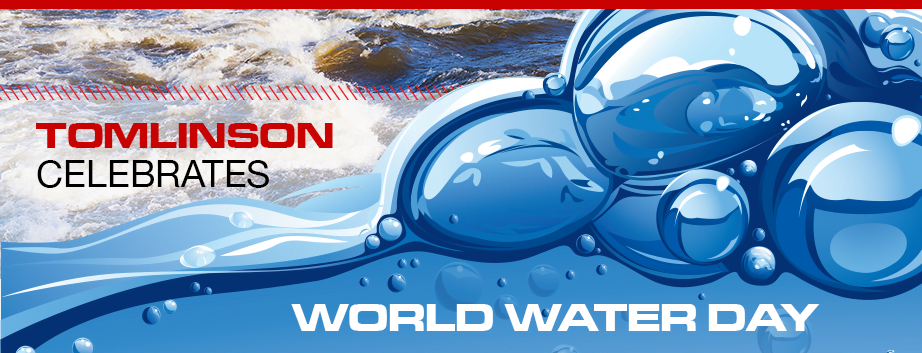
Tomlinson Celebrates World Water Day
Ten Reasons Why Wastewater Should Not Be “Wasted”
World Water Day is a great time to reflect on how fortunate those of us that have clean, safe, drinking water really are. Much of the world is not so lucky so it is critically important that we think about how we care for our precious, water resources.
While having quality, drinking water is more appreciated than ever; wastewater is still often viewed as “waste”. We are honored and excited to be part of this effort. Our Lystek team, who are recognized as leaders in biosolids and organics management, is working hard to change this perception with innovative, safe and efficient solutions for better use of wastewater resources.
Here are 10 good reasons why properly managed wastewater resources should not be wasted:
- Scarcity of water. Salt water is plentiful, but fresh water is scarce. Failing to re-use wastewater means failing to maximize a valuable resource. Recycling of wastewater, through scientifically advanced, resource recovery systems puts much-needed, clean water, back into circulation.
- Safe water. One tenth of the world’s population lacks access to clean, safe water. When un-treated sewers run through communities they undermine health and well-being, trapping many people in a cycle of poverty. Conversely, when proper wastewater treatment systems are in place, they allow for the removal of bacteria and other contaminants so clean water can flow through communities that need it, thereby helping organizations like World Help save lives.
- Energy from wastewater. Advanced, technical solutions can also be used to increase the production of biogas in digesters at wastewater treatment plants. This remarkable source of alternative energy can help to reduce operational costs, decrease greenhouse gas emissions and even power these facilities thereby converting traditional plants into Wastewater Resource Recovery Centers (WRRC). This can help reduce the negative impacts of climate change.
- Fertilizer from wastewater. With today’s technologies, it is also possible to convert biosolids into safe, pathogen-free, nutrient-rich, Class A quality biofertilizers. These products can be ideal for promoting healthy, productive soil and plant life. Converting treatment plants into WRRC’s is a great way to turn wastewater into valuable products.
- Diversion of waste from landfills. When treated as “waste”, wastewater biosolids are too often dumped in landfills – more than nine million tons across North America, annually. This practice is not sustainable as it takes up valuable space and sends greenhouse gases into our atmosphere. Conversely, when treated with methods based in sound science and research, the material can be recycled for higher and better uses, reducing the need to create more landfills.
- Cost savings & revenue generation. There are wastewater management solutions available today that offer low capital, energy and operating costs while producing valuable, much needed products with real market value. Forward thinking generators are already taking advantage of these opportunities to reduce costs and make positive contributions to the circular economy.
- Create green spaces. Wastewater resources are now being viewed by many cities as an opportunity to do public good. In Lima, Peru, for example, treated wastewater has played an important role in creating a public park where residents can enjoy rare, green space. The water and nutrients stay in the city, providing new benefits in their recycled form.
- Lower carbon footprint. Drinking water can be especially vulnerable to the effects of climate change. Responsible wastewater management helps to minimize these risks by using safe, proven approaches to keep the carbon in the ground and reduce greenhouse gas emissions.
- Save energy. States like California have already invested a great deal of money and time in finding ways to decrease the amount of energy required to manage precious water resources. Recycling wastewater reduces the amount of energy otherwise required to pump it over long distances for further treatment or disposal, making it part of the energy conservation solution.
- Prevent erosion. Recycled wastewater contains valuable nutrients and organic matter that keeps soil healthy. Healthy plants and soils are also able to retain more moisture (i.e. water), thereby reducing the potential for run-off in areas where soil degradation and erosion threaten already-scarce water supplies.
About Lystek International
Lystek International Inc. is a leading provider of Thermal Hydrolysis solutions for the sustainable management of biosolids and organics. The multi-use, award-winning Lystek system reduces costs, volumes and GHG’s by converting municipal and industrial wastewater treatment facilities into resource recovery centers. This is achieved by transforming organic waste streams into value-added products and services, such as the patented LysteMize® process for optimizing digester performance, reducing volumes and increasing biogas production; LysteGro®, a high-value, nutrient-rich biofertilizer and LysteCarb®, an alternative source of carbon for BNR systems.
For more information on Lystek and its technology and products, please contact Kevin Litwiller, Director of Marketing & Business Development
Cell: 519.584.5437 | Office: 226.444.0186 x 106 | kevinl@lystek.com
